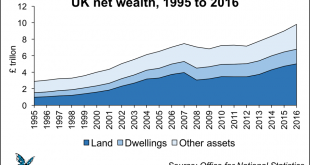Skyrocketing land rent in the UK. In just two decades the market value of land has quadrupled, increasing recorded wealth by over £4 trillion. The driving force behind rising house prices — and the UK’s growing wealth — has been rapidly escalating land prices. For those who own property, this has provided enormous benefits.... Open DemocracyIt’s Time to Call the Housing Crisis What It Really Is: The Largest Transfer of Wealth in Living Memory Laurie Macfarlane
Read More »Katrina vanden Heuvel — Registering the Cable Channel RT as a Foreign Agent Is a Threat to Press Freedom
Stigmatizing Russian broadcasting is the latest unnecessary escalation in the new Cold War. Western elites are playing with fire in the expectation of political gain at the expense of risking war and threatening liberal democracy in a bogus attempt to defend it.On the other hand, sates do has the right and responsibility to protect themselves from foreign influence, and tin this regard the US has also been a key player in influencing other countries.So there lines that need to be drawn. The...
Read More »CGTN — How smart are China’s electric toilets?
Giving "innovation" new meaning.EcnsHow smart are China's electric toilets? CGTNSee also'World's first cargo drone' shows off 'one-click landing' in ChinaAlsoA Chinese manufacturer's bittersweet bite of innovationAlsoFirm modifies violent mobile game to include socialist core values
Read More »Caitlin Johnstone — ‘The Atlantic’ Commits Malpractice, Selectively Edits To Smear WikiLeaks
See that full stop at the end of the last sentence there [in The Atlantic quote of Wikileaks]? That’s journalistic malpractice. Selective editing in one way spin and disinformation get created. Another is selective reporting that omits relevant facts. This is how propaganda works to create faked news. The author of the Atlantic article, Julia Ioffe, put a period rather than a comma at the end of the text about not wanting to appear pro-Trump or pro-Russia, and completely omitted WikiLeaks’...
Read More »Washington’s Blog — How to Instantly Prove (Or Disprove) Russian Hacking of U.S. Election
The nitty-gritty behind William Binney's claims.Washington's BlogHow to Instantly Prove (Or Disprove) Russian Hacking of U.S. Election
Read More »Moon of Alabama — The Non-Coup Coup In Zimbabwe
Backgrounder.Moon of AlabamaThe Non-Coup Coup In Zimbabwe b
Read More »Giddens: We are suffering from ‘cosmopolitan overload’ and a huge task lies before us – to create responsible capitalism — Labinot Kunushevci Interviews Anthony Giddens
Giddens: We live in a world that has moved ‘off the edge of history’ at the same time as it remains deeply embedded in it. By this I mean that today we face risks that no other civilisation has to deal with – such as climate change, the massive growth in world population, or the existence of nuclear weapons. Some of these risks are existential: they are threats to the very continuity of the industrial order as it spreads across the face of the earth. We cannot say which are the ‘most...
Read More »Chris Hedges – RT America Torched in Witch Hunt
In one of the most horrendous blows to press freedom since the anti-communist witch hunts of the 1950s, the U.S. Department of Justice has forced the news broadcaster RT America to file under the Foreign Agents Registration Act (FARA). The assault on RT America, on which I host the show "On Contact," has nothing to do with the dissemination of Russian propaganda. It is driven by RT America's decision to provide a platform to critics of American capitalism and imperialism, critics who...
Read More »RT – Do Americans deserve to hear us, with our 50 yrs intel experience? ‒ McGovern to Binney
RT America’s Ashlee Banks asks NSA whistleblower Bill Binney why do you think that improving relationships with Russia is such a threat to the US establishment he replies saying it's because the Military-Industrial Complex want to start another cold war to swindle and fleece Americans out of even more $trillions. [embedded content] President Donald Trump repeated his assertion over the weekend that Moscow did not meddle in the 2016 presidential election, in direct conflict with...
Read More »Brian Romanchuk — “An Introduction to SFC Models Using Python” Paperback Edition Published
My latest book: An Introduction to SFC Models Using Python is now available as a paperback edition.… Stock-Flow Consistent (SFC) models are a preferred way to present economic models in the post-Keynesian tradition. This book gives an overview of the sfc_models package, which implements SFC models in Python. The approach is novel, in that the user only specifies the high-level parameters of the economic model, and the framework generates and solves the implied equations. The framework is...
Read More » Mike Norman Economics
Mike Norman Economics

